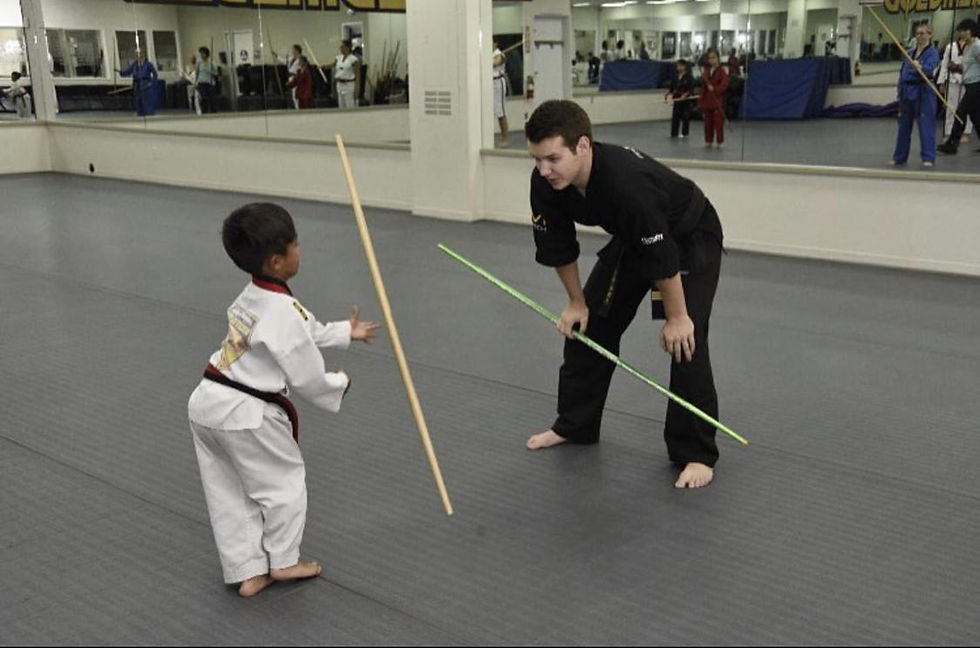5 Keys to Sport Karate Success: Part Three - Be a Leader
- Jackson Rudolph
- Sep 27, 2022
- 4 min read
Updated: Nov 8, 2023
This is the third article of a five-part series in which I will be sharing my opinion on the five most important steps one must take on their journey to become a successful sport karate competitor. If you haven’t read part two about seeking mentorship, you can find it here.
Towards the end of that last article, I wrote about the importance of seeking mentorship from your fellow competitors, especially those who have more experience than you. The topic at hand in this piece, being a leader, reveals the other side of that relationship.
The first two steps we have discussed, showing up consistently and seeking mentorship, are really the only tools you need to understand what is going on at a tournament and start climbing the ranks as your skills improve.
This third step about leadership assumes that you have been participating and learning for several months to a year, and you are now ready to start assuming responsibility within your career.
This begins with something as simple as helping a new competitor understand the rules of a division or the proper way to bow into the ring, such that you can now be the mentor much like your fellow competitors were for you when you first started competing.

The most important concept to understand right away is that you do not have to be one of the best competitors in the division to be a leader. Supporting your fellow competitors by giving advice to those less experienced than you or giving handshakes and fist bumps to the competitors who are ahead of you is essential to fostering a positive competitive environment.
Leading by example this way will help you gain the trust of your competitors, which will allow you to learn more from them and in general have a more enjoyable experience sharing the ring with them. Nobody likes the guy that is secluded from the rest of the competitors in the ring, who never shows support for other competitors and is always complaining about scoring or the efficiency of an event. I guess the easiest way to describe this first aspect of leadership is to just be a good person.
As you might expect, the leadership necessary to become a successful sport karate competitor extends beyond the basic sportsmanship described above. Another important feature of leadership in sport karate, or any competitive field, is the way you carry yourself given the outcome of a division. Not only does this play into this discussion of sportsmanship, but competitors who do not handle wins and losses appropriately often develop a poor reputation. The right way to handle wins and losses is pretty straight forward. If you lose, shake the hands of the judges and your competitors, congratulate the winner, and (if you so choose) respectfully ask the judges how you can improve. If you win, still shake the hands of your judges and competitors and continue to congratulate your opponents on their solid performances.
This seems elementary, but there are too many instances of competitors storming out of the ring when they lose a division or a point fighting match, as well as occasionally competitors not winning with the grace of a true champion.
The goal is to develop this sport to become a legitimate professional activity, so it is important that our champions act like professionals.

There is one more place where competitors can demonstrate leadership that is often forgotten… social media. Especially as social media becomes increasingly important for employment opportunities and college acceptance, every competitor should be cognizant of what they are posting on social media.
Leaders do not post inappropriate content, get involved in petty debates with critics, publicly provide harsh criticism of others, or post anything that is unbecoming of someone who has been bestowed a black belt.
No matter what style you come from, there is a code of honor that every martial artist should follow and that should not be forgotten on the internet. Instead, leaders in the sport karate community use their social media platforms to inspire young athletes and sometimes even share competition tips or tutorials. Using social media to bolster positive conversation about the sport is an excellent way to be a leader.
After this diatribe it should be apparent that I feel leadership is important, but why is it so important through the lens of sport karate? This sport is dependent upon what I’ll call “trickle-down inspiration”. A kid goes to a tournament, attends the night show, and they see the performance on stage that makes them decide they want to be a world champion someday.
That same kid trains hard to achieve that goal and sure enough competes on stage one day themselves. When that kid is on stage, there is another kid watching and being inspired to do the same thing on their journey. Being a leader and inspiring others isn’t just good for an individual’s sport karate career, it is essential for the prolonged survival of the sport.


